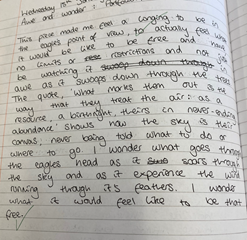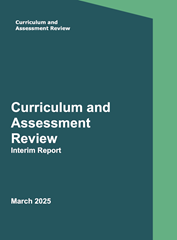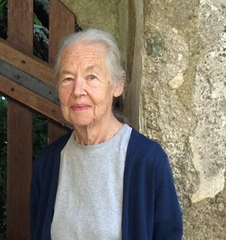In planning this talk for EMC’s 'What Matters in English?' Conference (now sadly postponed), I thought hard about what I might want to say. Twenty-five minutes and the whole of English teaching is a tall order. But actually, that’s fine. It allows me to follow my own precepts and concentrate on the big picture – what’s most significant. Big picture thinking for students, so why not a bit of big picture thinking for us right now?
So I’m going to focus on five of the things that matter most to me about English teaching. And surprise, surprise, number one is…
1. The big picture.
That’s what matters in English.
It’s a subject that is all about ranging around, making links and connections, seeing texts in relation to each other, making small detail serve ideas and meanings and yet, we’ve come to a point where English is increasingly atomised, fragmented – shards of knowledge that we’re struggling to piece together into a coherent whole. As little pieces of this and that, it makes no sense.
Every aspect of the subject is at risk of being shrunk to small things – we’re encouraged to quiz for small bits of knowledge, test recall of little items, assess atomised achievements, make knowledge organisers that list information, put into long term memory lots of detail. Language is only words not bigger structures of meaning. Texts are just lists of techniques. All this, when the truth is that real learning in our subject is complex, interconnected, woven together strands, where knowledge and know-how are inseparable, and knowledge of one text depends on a wide web of broader textual understanding. Where detail needs to be brought into play to develop lines of argument, responses, big understandings, thoughts and feelings.
Having big ideas, understanding how the subject works, thinking conceptually and making deep and interesting connections is what matters most.
And in the teaching of writing, talk and reading, having purposes and making meaning should be the engine driving everything. It’s the machine into which the smaller cogs fit. Without the driving force of the machine the cogs are just still, silent bits of an unmoving mechanism. (I haven’t chosen the the word ‘unmoving’ by chance. It can apply in more senses than one.)
Or to take an altogether different metaphor, English is a quilt, made of many different pieces. Each piece connects with another. It has beauty. It is an artwork as well as having a functional purpose. It encompasses a history – a set of traditions, the personal as well as the social, as is often the case with family quilts. If we unpick the pieces, we’re left with something that makes no sense, that is fragmentary and provides no intellectual or emotional warmth.
2. The person learning and their role in the process matters.
It matters a lot.
Texts need readers in order to be texts. The short story writer John Cheever expressed it really well when he said:
I can't write without a reader. It's precisely like a kiss — you can't do it alone.
We need readers to understand texts and we need to listen to students and their voices.
Recognising and respecting the cultures and talents of those we teach matters. Not talking in terms of gaps and lacks, deficits and poverty and emptiness. The gaps and lacunae are in the texts, not in the students. Students bring to those gaps their own experiences of reading, of life, of culture, of thought. And we ignore these at our peril. In a subject which is all about affect (the emotions as well as the intellect), ignoring what our students think and feel is not allowing them to do the subject well.
We need to take students with us and make use of what they bring with them into the classroom. Cultural capital as applied to education has taken off in recent years and I’ve said lots about it elsewhere. If cultural capital is, as Bourdieu really saw it, habits of being in the world as much as specific items of knowledge, then how can we give our students the cultural confidence they need, if everything they encounter in school tells them that they are impoverished, poor, lacking and of no value. Cultural wealth and power, and culture itself, are highly complex ideas that have been reduced to something very simple and crude – more of the canon and less of what students themselves bring to the table. And to me that matters a lot. Diversity isn’t just about being relatable. Failure to think about diversity is a fundamental misunderstanding of what education and our subject are all about. What different readers bring, and what diverse texts offer, enhances and enriches the subject for everyone.
3. Doing what makes sense in terms of English, as compared with other subjects matters
It matters in writing and assessment, in curriculum design and understandings about what knowledge is, rather than squeezing English into a structure that makes it something entirely different. In English we’re about what’s unknown and unknowable as much as we’re about known truths and certainties. We’re about ambiguity, interpretation, preference and selection. We’re about affect and response.
In writing an answer to the essay question, ‘Explore the theme of corruption in Jekyll and Hyde', each one of us might choose different elements, different quotations, different starting points for our essay and still all be writing really good essays. No other subject is quite like this, I think (though creative arts subjects like Drama and Theatre Studies have some common aspects in their written elements). In other academic subjects, even those with a strong interpretative element, like History, there is a body of key information which you really must not leave out. In English, you could start your essay talking about the use of oppositions and blurring of distinctions in Jekyll and Hyde, or with the way the inside/outside settings of London suggest corruption, or the way Stevenson uses the two characters to explore ‘hidden’ corruption and hypocrisy, or jump in with the use of night-time as a symbol for the darkness within, or think about the way that Gothic tropes of horror are used to create a visceral sense of disgust, or consider why corruption is so strongly associated with masculine behaviour, or explore the text more psychologically than socially, examining the depiction of the corruption of the soul, or question the ‘under the surface’ discussion of sexual corruption and so on and so on. It’s why hundreds of articles can be written about this one text, each of which takes a fresh angle. There is no text book, no single reading, no final ‘now I know all I need to know about this text’ for English. If I switched to another question, say on the structure of the novel or on the use of the detective genre, or realism versus fantasy, I might draw on entirely different evidence, quotations and ideas from the same text. Knowledge organisers, summaries of events and characters, who, what, when quizzes, information about the writer or Victorian England generally don’t even get you to the starting-gate of literary analysis and interpretation, let alone thundering down the track towards the finishing line.
So what matters in English may be rather different to what matters in other subjects. And, as a result, the big prescriptions and proscriptions that seem to fall from the sky like manna – I’m going very big on metaphors here – are really less like manna from heaven than like biblical plagues of locusts, devouring our subject and leaving nothing in their wake.
4. Teacher enjoyment, satisfaction, motivation, enthusiasm, expertise and judgement matter.
These things matter hugely. English teachers and their feelings about their work matter hugely. English teaching as delivery of a 17-slide Powerpoint, which makes no space for the students’ responses, nor for the teacher’s expression of their own thinking and feeling, is not pleasurable. There was a wonderful set of tweets recently, sparked off by a blog by James Durran on questioning, in which he argued for teachers to ask students genuine questions, ones they really wanted answered. I joined in, saying that the joy for me of teaching (both school students and teachers on CPD) was the way in which new insights sprang up (for me as well as for them), through the collective experience of what Professor Neil Mercer describes as ‘interthinking’. In other words, if you think together (through talk), you discover more than you thought you knew, or understood.
It matters a lot to me that students in English classrooms should be treated with the kind of respect that says, ‘I have lots of ideas about this text but you may have others that illuminate it for me in fresh ways. I’ll challenge your thinking robustly if I don’t think it has validity but I’ll take great pleasure in hearing you counter my views with ones that are plausible, or add new ones that help me see the text afresh.’
And that kind of fresh insight can come from any student. From all students, regardless of attainment level. They can see things slant. They can have angles that are different. They can bring to bear knowledge from their own cultures and their own lives. Why ever wouldn’t I want to hear that?
The joy of teaching, for me at least, came not only from the dialogues about texts with students but also with the teachers I worked with. Not ‘here’s my sequence of 10 lessons for you to deliver’ but ‘what do we think is most interesting for us to focus on in this text? What makes it special? What might we teach after this text to allow two texts to bounce off each other?’
6. Finally, what matters to me is a responsive curriculum
If you crowd lessons with information and instruction, with slides filled with content, and leave no space for students to talk, either to each other, or to you, not only do they lose the opportunity to express their ideas but, just as importantly, you lose the opportunity to learn about them and what they need from you.
- What do they think?
- How much do they understand?
- Is the choice of text or task or angle pitched right for them? Is it too obvious or too challenging?
- What is their cultural life like outside of school? What languages do they speak? Are they fluent in them? Are they literate in them? Do they read books in their home languages? What songs, or nursery rhymes or poems or stories do they know and love? Do they read at home? With their parents or on their own?
- What fires their imagination? What moves them, makes them laugh, inspires them, concerns them?
- What do they think, about the book you’ve chosen, about books they’ve read in the past, about English as a subject?
- What fears do they have when they enter your classroom? About reading aloud? About their spelling? About the validity of their ideas?
Responding to them is more than just giving them feedback on their work, piece by piece. It’s a two-way process – a dialogue that allows both you and them to work together to develop their thinking, reading, writing, speaking and listening.
These five things matter to me.
I want to end with a short text. As an English teacher, I always want a text to be there, to speak for me and with me.
It’s called ‘Flight’ and it’s by a young American writer, Idrissa Simmonds. [The text can't be included for copyright reasons, so please click the link.]
Could I spoil the experience of this for you?
I think I could. I could do it by telling you all about it. By listing things you should know and learn by reading it, before you ever read it. By telling you what it is. By telling you what it’s about (as if that were what literature is all about). By starting with all the words you don’t know and defining them for you. By focusing on things that you don’t really need to know.
But I’m not going to do that. I’m going to give you a few minutes to talk to each other about it (or read it for yourself now given that this speech is now online only, and give yourself a few moments to think about it and enjoy it).
Now, let’s consider this. Which of these questions might be of most interest for you to pursue? And which might need me to start the conversation for you?
- What is it? What genre? Poem/autobiography/prose? What makes you think that?
- Who’s it written by?
- What does cacophony mean?
- What does buk mean? (big ugly kid syndrome)
- What is Kreyol (Antiguan, Haitian, Liberian creole)
- What are Mary Janes? (quite old-fashioned girls’/women’s shoes with a bar across)
- Where is Pine and Loring? (A place in Brooklyn.)
Next lesson, what would be worth remembering? In other words, what matters? How it made you feel? What stood out for you? What it taught you about poetry and other genres?
Probably not what cacophony means, or what Mary Janes are or where Pine Loring is – though some of these things may stick in your mind. Kreyol for instance stuck in mine. That interested me because I’m especially interested in language.
What we encourage students to take away with them, what we want them to remember and apply to new texts and new learning matters a lot. The question of what knowledge is remembered matters much more than agonising over how students can be made to remember.
Now some of the things that matter most to me about English teaching were there when I first started teaching. But it seems to me, very sadly, that for many students and teachers they are no longer. That’s not to say that everything was wonderful. Just that teachers had more autonomy. Their judgement was respected to a greater extent. For structural and ‘edu-cultural’ reasons, Heads of Department were able to assert themselves more strongly. And there seemed to be a more valid and solid connection between school English, the English you did for your degree, the conceptualisation of the subject for your PGCE and then what you did in the classroom. English was like ‘Brighton rock’. At whatever point you sliced it, it had some common things running through.
We need to get that autonomy and professional respect back. And it seems to me that a fundamental part of this is working out for ourselves again, rather urgently, what matters in English.
Postscript
That’s what the conference will explore when we re-schedule it after the coronavirus crisis subsides. It’s what my book What Matters in English Teaching is all about. I hope that English teachers up and down the country will read the book and use it to provoke discussions, debates and fresh thinking about the nature of our subject. I would very much welcome comments, thoughts and, responses, at the end of this blog, on Twitter and in other forums.





